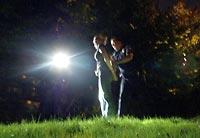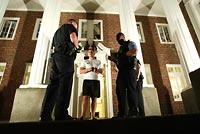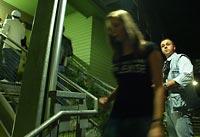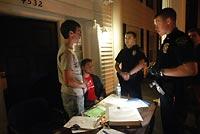It's just another night out on Montlake

Seattle Times reporter Nick Perry and photographer Amanda Smith rode along with the UW Police last weekend to get a glimpse of the campus at night.
Midnight Friday: The Theta Delta Chi fraternity is throwing a party, a tongue-in-cheek tribute to Steve Irwin, TV's "crocodile hunter" who died last month after a stingray attack. Inside, fraternity brothers have set up a small shrine to "The Irwin" with candles and photos of his beaming face.
The fraternity has followed the rules by registering the party with the UW. That gives UW Police Incident Prevention Teams authority to enter and check up. That policy was put in place after the 2003 riot, during which several rowdy parties spilled onto the street, leaving a car overturned, a mattress ablaze and several police cars damaged.
Inside, officers Mike Smerer and Tom Trykar navigate a flood of students who abruptly desert the bar as they enter. Someone yells, "Anyone under 21 put their beer down!" Smerer heatedly warns the bartender about the consequences of serving underage students.
Fraternity president Peter Schmitz says his fraternity is among the better behaved. At the party, which has drawn about 200 students, they've been issuing wristbands to distinguish who can legally drink.
"Unfortunately," he acknowledges, "there are some security leaks."
12:30 a.m. Saturday: At the nearby Alpha Sigma Phi fraternity, the president, wearing shorts, flip-flops and a T-shirt proclaiming "Beer is living proof that God loves us and wants us to be happy," wanders outside to answer complaints that the brothers are breaking 75-decibel noise regulations. A Seattle police officer has shown up, warning, "First time you'll get a ticket, second time you'll go to jail." The president agrees he doesn't want that to happen: "I'm leaving at six in the morning for Vegas," he says.
Soon after, a student walking to the Theta Delta Chi party is caught with an open bottle of Miller Lite. He is ordered to dump it and is issued a $103 citation. He looks mad. A friend says his mom is a lawyer.
1 a.m. The big call of the night. Suspects are breaking and entering the campus Communications Building, the dispatcher says over the police radio. Several campus police cars race over. Outside the building, two male students and one female student are ordered to lie spread-eagled on the ground while they're handcuffed. It turns out that as a lark, they'd slipped through a security fence and climbed up some exterior scaffolding. But the police are not amused: They take the students to temporary holding cells and book them on suspicion of second-degree trespass.
The UW has two such cells. They are colored battleship gray except for patches of the ceiling that reveal the previous color — "embryonic pink" according to Lt. Peter Celms. He says the pink was the psychology department's idea ("only at a university") and was supposed to soothe prisoners by subconsciously taking them back to the womb.
"It got so dirty so fast," Celms said. "And we couldn't stand it."
1:30 a.m. Officer Stefan Pentcholov walks through the McMahon Hall dormitory, the largest on campus with just more than 1,000 students. Unlike the incident-prevention teams around the fraternities, Pentcholov wears plain clothes. He has his badge hanging from his neck and gun hidden under a denim vest.
He is the gregarious type and has an easy manner with the students.
Far from causing trouble on this particular night, the students who are awake in the common areas are chatting or studiously working on laptops. One student is staggering back to her room. Pentcholov talks to her for a few minutes. She says she's had four drinks. "Go to bed," he tells her.
UW police patrol the hallways but don't enter rooms without permission.
A legal debate over whether dorm hallways are public places resulted in a Whitman County judge throwing out two cases against students at Washington State University in the spring. The judge found that police invaded the students' privacy by wandering the hallways. This fall, WSU regents put in place an emergency measure to reinstate residence-hall patrols.
At the UW, police say different rules specifically allow them in the hallways. And if, for instance, they smell marijuana smoke under a door, they can pass on their suspicions to the UW Housing and Food Services, which can censure or evict students.
The most serious crime the UW Police deal with regularly is date rape — five rapes and one attempted rape were reported last year, an unusually high number, although King County didn't prosecute any of them, either due to lack of evidence or because the victims didn't want to pursue charges. The most recent murder occurred six years ago, when a troubled medical student shot and killed his UW mentor, then himself.
2:30 a.m. An officer drives slowly past a bike, checking that it's locked. Since shortly before classes started, bikes have been disappearing at the rate of nearly one a day, an all-time high.
Back on Greek Row, the blocks around 17th Avenue Northeast just north of the campus, most of the students who filled the sidewalks earlier are gone. To the southwest, a 17-year-old student is doubled over in the gutter. Sgt. John Bolding cites her as a minor in possession of alcohol, the evidence being her inebriation. That means a court appearance and possible conviction, although many first-time offenders are able to get convictions quashed after a probationary period.
For many students living away from home for the first time, such a brush with the law comes as a shock.
"We have a zero-tolerance policy," Bolding tells the girl. "If we contact you, and you're under 21, you can expect a ticket."
3:15 a.m. Bolding takes a close look at a white man in his 40s or 50s walking along Greek Row. He looks similar to a sketch of the serial flasher, who has exposed himself to at least four people since students began returning to campus.
King County records show two dozen registered sex offenders live near Greek Row, including several at a halfway house nestled in the midst of the houses.
The man keeps walking, and Bolding slowly pulls away. The busy part of the night is over. It's time to return to base, drink coffee and fill out paperwork.
| Campus crime | |
| The University of Washington Police Department is primarily responsible for patrolling the campus. UW officers also work with the Seattle Police Department to check nearby streets and drop in on parties thrown by fraternities and sororities. The following reflect the number of reports of on-campus incidents to UW police in 2005. | |
| Incident | No. of reports |
| Forcible sex offense | 6 |
| Robbery | 2 |
| Aggravated assault | 2 |
| Burglary | 87 |
| Motor vehicle theft | 46 |
| Arson | 2 |
| Liquor offense | 30 |
| (not including DUI) | |
| Drug offense | 9 |
| Assault | 24 |
| Theft | 594 |


